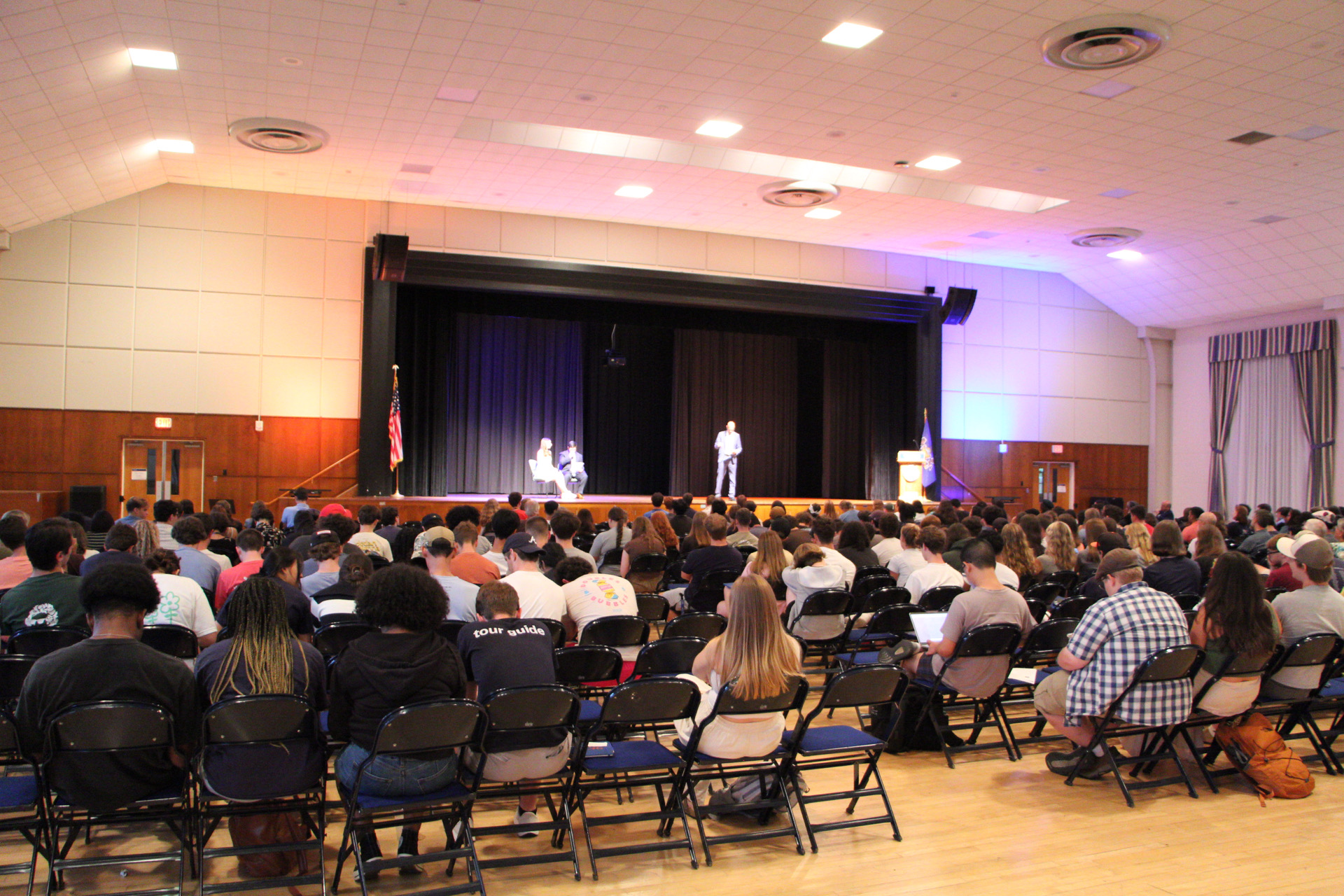Conversations for Change Seeks to Encourage Dialogue, Bridge Political Gaps

Students listen to Rajiv Vinnakota during the College’s first major Conversations for Change event held on Aug. 26. (Vincent DiFonzo/The Gettysburgian)
By Brandon Fey, News Editor, and Vincent DiFonzo, Editor-in-Chief
Political polarization in the United States has reached record highs in recent years, leading to disagreement, distrust and a lack of effective communication between political adversaries.
Last academic year saw major protests on college campuses across the country — most were peaceful, but some turned violent. Following the Columbia University encampment, protests and counter-protests regarding the Israel-Hamas War quickly spread nationwide and beyond, with major protests on at least 60 campuses in the U.S. alone.
No matter which side comes out on top, the 2024 election cycle will likely result in extremely tight down-the-ballot results between the two major parties, a culmination of the widening gap between the political left and right. This semester, the College has taken up a new initiative to reduce polarization in Gettysburg, create constructive dialogue and get students civically engaged.
The new College initiative, officially titled “The Unfinished Work: Conversations for Change” and stylized as C4C, launched this semester with lectures, skill-building workshops and engagement activities scheduled throughout the year. It seeks to encourage respectful dialogue not only in politically-charged conversation, but in any disagreement or conflict that may arise between community members.
“While political polarization on college campuses has made constructive conversation across differences more challenging than ever, college campuses are precisely where those conversations are most needed,” said Vice President of College Life Anne Ehrlich.
C4C is led by College Life, the Eisenhower Institute and the Office of Multicultural Engagement, with assistance from the Office of Student Activities and Greek Life. President Bob Iuliano also partnered with the Institute of Citizens and Scholars and signed onto their College Presidents for Civic Preparedness initiative.
Through C4C, the College strives to encourage students to meaningfully consider their beliefs and values and then challenge them to expose themselves to those with differing opinions.
According to Ehrlich, “This may result in someone changing their mind, or it may not. But, if done well, it definitely facilitates empathy, community and the ability for us all to bring our diverse perspectives together to make positive change in our communities.”
Assistant director of OME Mauricio Novoa emphasized that the initiative extends beyond politics, saying “It’s not exclusively for the election. It’s like, you know you have interpersonal conflicts with your friends or with other people, you’re able to have those skills, to have that conversation first because that’s the baseline you want to have.”
The initiative also involves the creation of two small dialogue groups aimed at giving students the opportunity to develop and practice critical skills in engaging across differences. These will include seminars on sustained dialogue with EI and the Garthwait Leadership Center and intergroup dialogue through College Life.
Student clubs and organizations are also encouraged to contribute by developing their own programs for advancing the C4C’s goals, for which they may apply for “mini-grants.” Novoa expressed hope that the mini-grants will be used by a variety of student clubs to host events on more focused topics related to C4C.
The effectiveness of the initiative, according to Ehrlich, will be measured by any change in the campus community’s desire to have conversations across differences and by the community’s confidence to converse in a respectful and meaningful way.
Ehrlich commented that the initiative has “had people from all corners of campus approach us with their own ideas and programs that have similar goals and want to work with us and align with us. I think the problems I outlined above are on everyone’s mind, and we all know that none of us can solve them on our own; it’s exciting to feel the campus rallying around this critical work.”
College Life, EI and OME will continue to plan workshops and speaker events throughout the year, with the goal of involving more and more members of the community as the initiative progresses.
This article originally appeared on page 14 of the No. 1 October 2024 edition of The Gettysburgian’s magazine.
